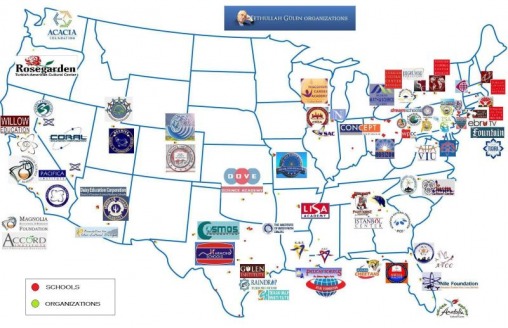A Turkish religious and social movement is behind one of the best schools in Syracuse.
MOVED TO TEACH
In the second part of a New Times examination of the Syracuse Academy of Science Charter School, reporter Ed Griffin-Nolan describes how Turks inspired by Fethullah Gülen have created a highly regarded charter school.
Editor’s note
“Charter Flight,”
the cover story for the Oct. 16-23 issue, told the story of the Syracuse Academy of Science Charter School. SAS stands out in two significant ways: 1) minority students perform better on state tests than their white classmates do, which runs counter to most urban public schools; 2) the leadership of the school rests in the hands of men of Turkish origin, many of whom have been influenced by or admire Fethullah Gülen, a Turkish imam who has resided in Pennsylvania’s Pocono mountains since 1999.
In subsequent months, the New Times
has been examining the links between SAS and the Gülen movement. The results of our reporting appear below.
The Syracuse Academy of Science Charter School (SAS) has for 10 years had one of the highest-performing student bodies in Central New York, boasting impressive test scores and college acceptance rates for its high school on Park Street.

Students inside a classroom in the Syracuse Academy of Science Charter School.
Michael Davis Photo | Syracuse New Times
Hundreds of parents enter their children to compete in an annual lottery to obtain one of the coveted spots at the academy. SAS students focus on science and math, win awards at international academic competitions, conduct research in conjunction with area scientists, study Turkish and travel to Turkey and other foreign lands.
The SAS model, which includes longer school days and extended summer classes, with no unions to please, might provide the answer to one of the most pressing problems locally and nationally: how to address lower-than-average academic achievement among poor and minority urban students.
That model owes a great deal to a social movement founded by a Turkish Islamic religious leader, Fethullah Gülen, who for the past 15 years has inspired and led his followers around the globe from his home in exile, a retreat house just a few hours south of Syracuse, in Pennsylvania’s Pocono Mountains.
The founders and leaders of SAS are, for the most part, Turkish immigrant men influenced, to varying degrees, by Gülen’s worldwide network. That network includes more than a thousand schools, media outlets, a trade federation, banks and more, according to Joshua Hendrick, of Loyola University Maryland, in Baltimore, who has studied the Gülen phenomenon extensively. He wrote
Gülen: The Ambiguous Politics of Market Islam in Turkey and the World, NYU Press, 2013.
The movement, known by its Turkish name “cemaat” (community) or “hizmet” (service), is all but unknown in Syracuse, yet it currently sits at the center of a scandal and power struggle that is rocking Turkey. In recent months, the Turkish government has been closing Gülen schools in Turkey, and Turkish Prime Minister Recep Erdogan has asked the U.S. government to extradite Gülen, the man he considers his chief nemesis.
For some people, any discussion of an ethnic or religious group, especially a secretive Muslim group, invites suspicion. Nothing in our reporting suggests any association with Islamic extremism; nor have we found any evidence of religious proselytizing at the school.
The Gülen phenomenon is as complicated as it is novel, and an open-minded reader will find many questions and no easy answers in this story.
“Gülen,” writes Stephen Kinzer in the April 18, 2013, edition of
Time, “is a man of mystery. His influence in his native Turkey is immense, exercised by graduates of his schools who have reached key posts in the government, judiciary and police. This makes him seem like a shadowy puppeteer, and he is scorned by almost as many Turks as love him.”
In that same issue of
Time, in which Gülen was selected as one of the 100 most influential people in the world, Kinzer describes Gülen as “the most potent advocate of moderation in the Muslim world.”
Gülen-inspired charter schools like SAS are not religious schools. Rather, they focus on the sciences, consistent with Gülen’s preaching – an offshoot of the teachings of the Turkish Kurd Said Nursi, which postulates that knowledge of God emerges from knowledge of the world. Gülen followers run private schools around the world, but only in the United States, with the growth of the charter school movement, have they been able to operate schools with public money.
Most, if not all, of the key players at SAS have links to Gülen-infuenced schools and institutions, yet they deny any organic connection to Gülen.

Hayali assisting students with schoolwork.
Michael Davis Photo | Syracuse New Times.
Tolga Hayali, 40, of Fayetteville, was principal of SAS Junior/Senior High School until last year. He holds the title of superintendent of three schools: SAS, the Utica Academy of Science and the SAS elementary school, in Syracuse. He and his colleagues envision their chain of schools extending across Upstate New York. When first asked about the predominance of Turkish natives among the school’s leaders, Hayali dismissed it as a coincidence having to do with a large influx of tailors to the Rochester area decades back.
Fehmi Damkaci, chair of SAS’s board of trustees and an associate professor of chemistry at the State University College at Oswego, deflected the question in a similar manner, attributing the large number of Turkish staff to the availability in the U.S. of Turkish students with advanced degrees in science.
Damkaci was educated in Turkey at Gülen-affiliated institutions, a trajectory familiar to Hendrick and other students of the hizmet. Damkaci began his career teaching at the Yamanlar School, in Izmir, Turkey, which Hendrick calls the model for Gülen’s network of schools worldwide. In Turkey, the schools, tutoring institutes, and related dormitories are the prime source of recruits for Gülen, whose followers number in the millions.
Hayali, Swiss-born son of Turkish parents, was given his start in the charter school movement by Ehat Ercanli, who began a charter school in Cleveland in 1999 that grew into Concept Schools, which runs 30 schools in four states. Ercanli, a professor of electrical engineering at Syracuse University and the founder of SAS, declined to speak with the
New Times.
The Syracuse Academy of Science shares characteristics, personnel, vendors, philosophy and practices with more than 130 Gülen-inspired charter schools in 26 states. Consider:
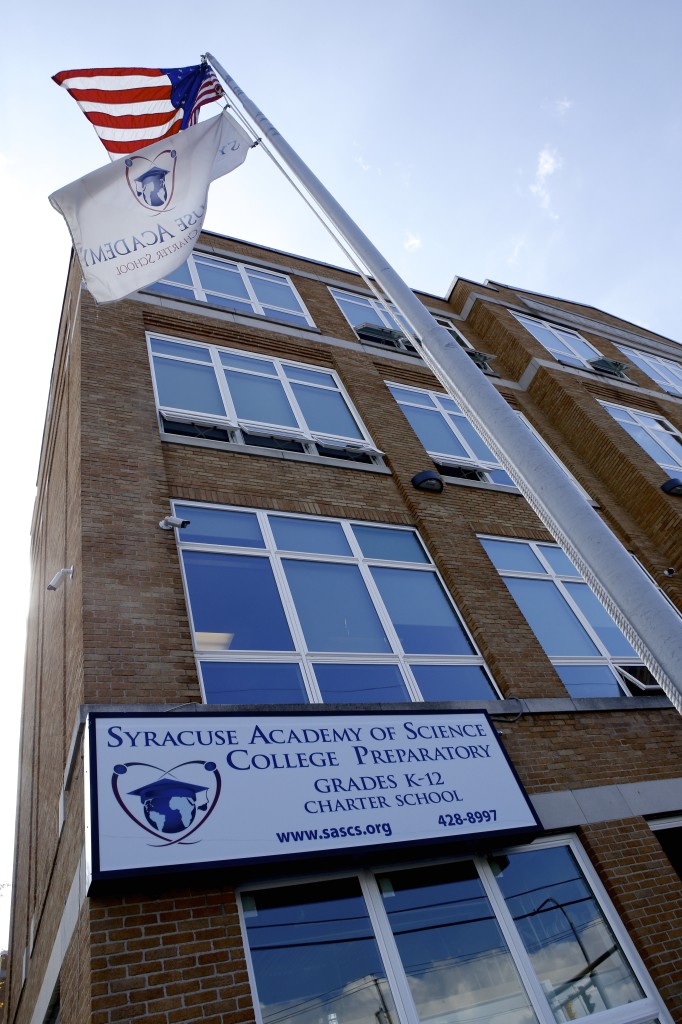
Outside view of the Syracuse Academy of Science Charter School.
Michael Davis Photo | Syracuse New Times
– SAS, unique among Central New York schools, imports teachers and other staff, most of them of Turkish origin.
– SAS hires contractors and subcontractors, many of them Turkish, used by Gülen-inspired private and charter schools around the country. This practice has drawn criticism from auditors at the state Comptroller’s Office.
– SAS hires many staff members who have worked at either Gülen-inspired charter schools or Gülen-affiliated private schools or organizations.
SAS officials adamantly deny any connection to the Gülen movement. “The only network we belong to is the charter schools movement,” says Hayali.
TEACHERS FROM ABROAD
SAS is the only school in Onondaga County to hire immigrant workers as teachers, administrators and staff. Since its founding in 2003, SAS has filed petitions for as many as 38 H1B visas for foreign-born teachers and other personnel. Under U.S. immigration law, H1B visas are for “people who wish to perform services in a specialty occupation.”
Hayali says that the total number of visas includes “new applications, subsequent renewals, denials … as well as required applications for current visa holders who have experienced position changes.” Hayali said that 96 percent of its staff is “local to the greater Syracuse area.” As of February, four of the 115 staff at SAS held H1B visas.
Damkaci said the school imports teachers due to a shortage of qualified math and science teachers in Central New York. “We have high standards, especially in science and math,” Damkaci says. “Of maybe 100 people on staff, the number on visa is maybe five or eight.”
As with an increasing number of Turkish-run charter schools across the nation, most of those teachers on visa are not just from abroad, but are of Turkish origin; 36 of the 38 H1B applications for SAS were for individuals from Turkey. The applications, Hayali says, represent the hiring of 15 teachers; some of the applications were for renewals or position changes.
“We are looking for quality,” says Damkaci. “We know how to recruit. Our goal is to bring in the best teacher regardless of their race, nationality, or gender.” It’s not unusual to have such a large percentage of Turkish teachers at the school, he says. “It’s like the math faculty (at a university). We know that Indians are really good at math. I don’t think this is too different.”
“Finding a math or science teacher,” says Damkaci, “is a nationwide problem.”
President Barack Obama acknowledged as much in 2012, when he proposed an $80 million program to recruit and prepare 10,000 teachers in the STEM (science, technology, engineering and math) fields.
But locally, this hasn’t been an issue. The Syracuse City School District has never seen the need to recruit internationally. School administrators countywide contacted for this story said they had never needed to import teachers from abroad, even in the STEM areas.
Damkaci told the
New Times that when SAS was hiring for its new school in Utica, which opened in September, it received 300 applications for about 10 positions.
SAS has not only applied for visas for math and science teachers. In 2011, the school sought H1B status for its director, curriculum coordinator, instructional coordinator in foreign languages, instructional technology coordinator and an IT administrator. In 2007, the school applied for a visa for a sociology teacher, and in 2009, for a psychology teacher; both were from Turkey.
In 2013, the school applied for a visa for a physical education teacher.
Is there a shortage of gym teachers in Syracuse.
“Not that I’m aware of,” says Kevin Ahern, a former teacher who worked in the Syracuse schools and is president of the Syracuse Teachers Association. “We have SUNY Cortland right here, pumping out about a hundred graduates a year.”
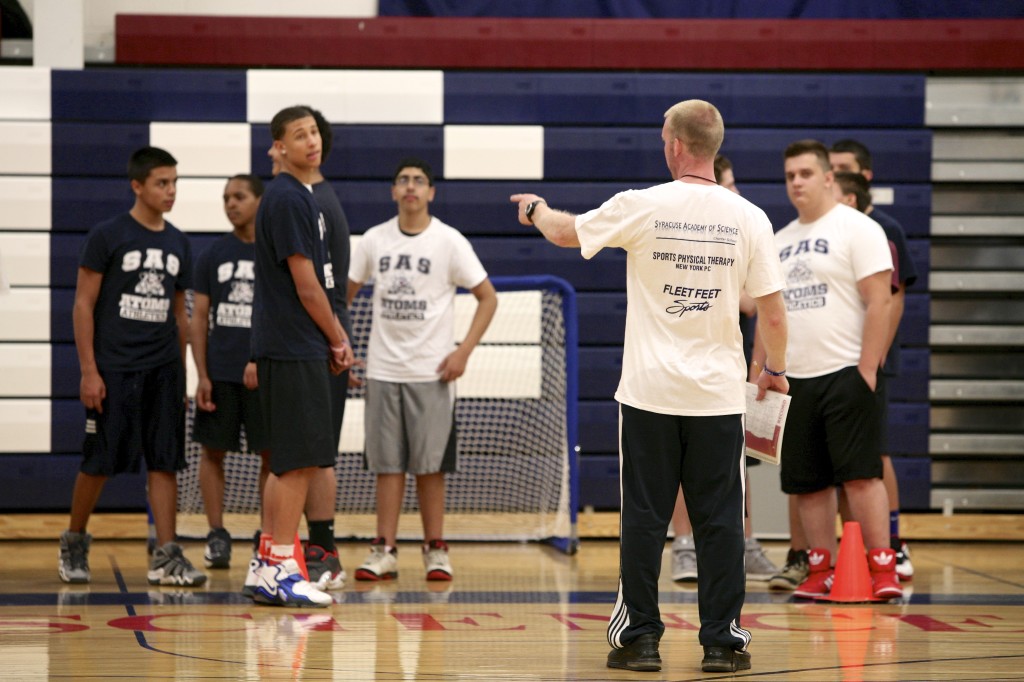
Gym teacher instructing students in the Syracuse Academy of Science Charter School.
Michael Davis Photo | Syracuse New Times
Asked about the importation of a gym teacher, SAS sent a written reply through its spokesperson, Kelly Gaggin, stating that the local pool of applicants didn’t include a candidate with the credentials or experience the school sought.
According to Jo Ellen Bailey, an associate professor who has taught PE teachers at Cortland State for the past 11 years, there are no additional credentials required for certification to work internationally. Cortland State students have the opportunity to work abroad during college in Australia or Germany. Recent graduates, she says, are finding the job market tight. While it is common for high schools to call her when they seek to hire a PE teacher, she has never heard from anyone at SAS.
MOVEMENT AMONG SCHOOLS IN THE NETWORK
When the SAS’s first director, Hakki Karaman, moved to California to run a charter school in the Gülen-affiliated Magnolia schools, the SAS board selected Hayali to run the Syracuse school. Hayali had earlier worked for Ercanli’s Horizon schools, which runs charters in the Midwest. Hayali left Horizon in Ohio to work at the private Pioneer Academy of Science of Southern New Jersey. Unlike SAS, Pioneer is a private school, one of as many as 1,400 such Gülen-inspired schools worldwide, and it is regularly praised in
Today’s Zaman, the largest English-language newspaper in Turkey and a Gülen media outlet.
Ercanli came to Syracuse and founded SAS in 2003, along with Yildiray Yildirim, an associate professor of management and accounting at the Martin J. Whitman School of Management at Syracuse University. Neither Ercanli nor Yildirim would agree to an interview with the
New Times.
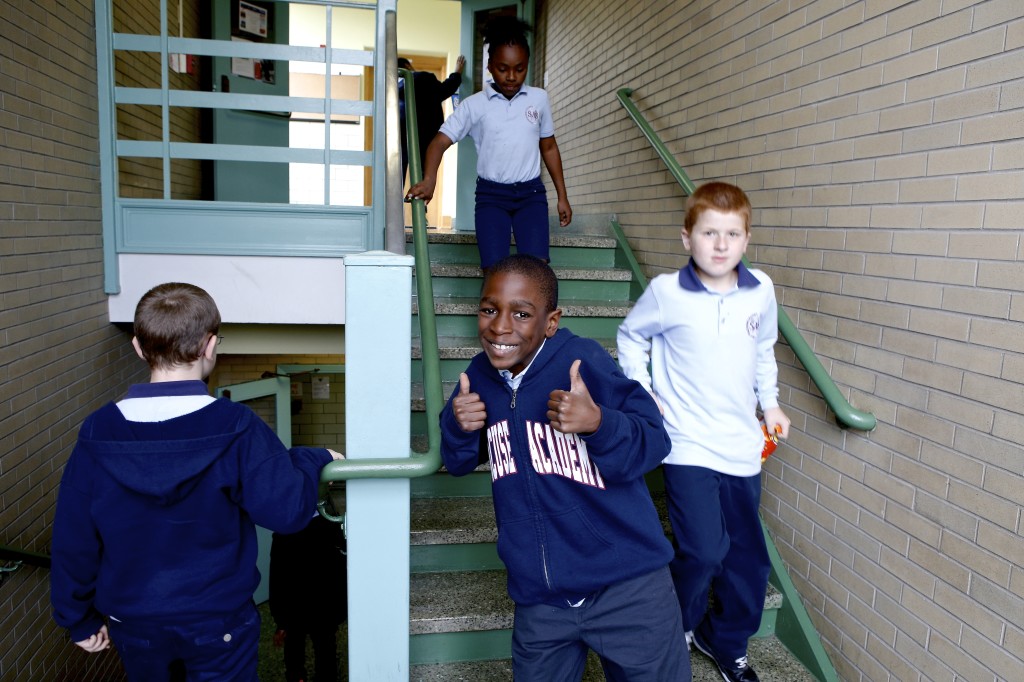
Students walking down a stairwell in the Syracuse Academy of Science Charter School.
Michael Davis Photo | Syracuse New Times
When Hayali announced the opening of the school in Utica in 2013, the principal he selected was Kadir Yavuz. Yavuz attended Virginia International University, Gülen’s first foray into higher education in the United States. Hayali was succeeded as SAS principal by Galip Bok, who came to Syracuse after serving as principal of Phoenix Academy, in Everett, Mass., a charter school founded by Damkaci.
Patricia Coban, who taught at SAS and served on its board since its founding, is on the faculty at Pioneer Academy in New Jersey. Coban’s husband, Mustafa, is the IT director for SAS. He files the IRS forms for Terra Education and Science Foundation, which owns the buildings that house the Syracuse schools. Damkaci, chair of the self-appointed SAS board, is president of Terra.
Hakki Karaman, the former director of the SAS, is principal of the Magnolia Science Academy, in San Diego, part of a network of California charter schools said to be Gülen-inspired. Magnolia, like the Pioneer and Concept Schools, also employs teachers on H1B visas. Timur Saka resigned as principal of a Magnolia school and moved to Syracuse in October to become the director of the Turkish Cultural Center (TCC) in Syracuse.
One of Saka’s first tasks in Syracuse was to lead a delegation of Central New Yorkers to Turkey. Such delegations, according to Hendrick and other scholars, help build relationships and advance the agenda of the hizmet.
Across the country, there is frequently overlap between leadership of Turkish Cultural Centers and charter schools. Damkaci, Yildirim, Ercanli and Hayali have been involved in the local Turkish Cultural Center, on Leavenworth Avenue. Damkaci is a past president of the center.
Turkish Cultural Centers around the United States all host the same types of programs and share the same logos and website design. The Syracuse center is not independently incorporated; it is a subsidiary of the center in New York City, which is, in turn, part of the Council of Turkic American Associations.
Furkan Kosar, president of the council, was principal of Pioneer Academy in New Jersey, where Hayali worked.
“We are not part of any network,” says Damkaci. “There is no such thing. I see that the same as if you say, ‘These people go to the same church or synagogue, they are part of that network.’ ”
AUDIT SUGGESTS BIDDING PROBLEM
Loyalty to the cemaat has earned SAS officials criticism from the state Comptroller’s Office.
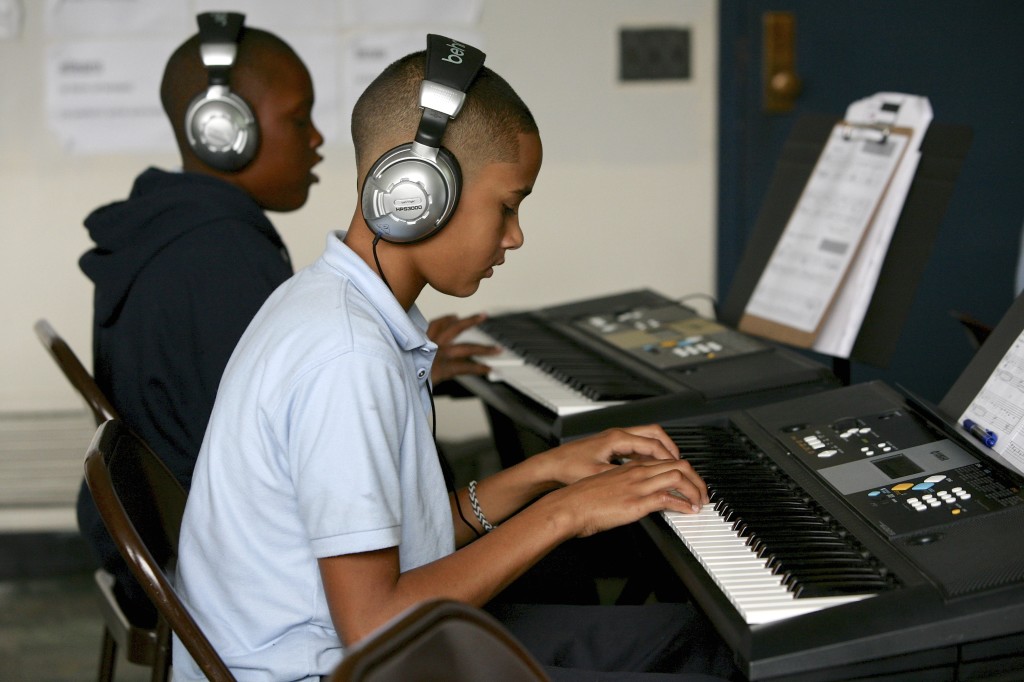
Students using audio equipment.
Michael Davis Photo | Syracuse New Times
According to an audit, several companies based in New Jersey were contracted to do hundreds of thousands of dollars of work for SAS under questionable circumstances. The audit, released in July, reads in part that “school officials routinely purchased school equipment and furnishings from a limited group of four vendors that were affiliated with one another. The required number of quotes was not always obtained, and quotes were sometimes obtained after the purchase was made. School officials did not document verbal quotes, making it impossible to verify that the lowest quote was used or that the school paid the correct amount. School officials also received quotes for school equipment and furnishings from vendors that did not specialize in such items, and did not attempt to identify more suitable vendors that could have offered more competitive prices.”
The audit did not identify the vendors, but the comptroller’s office, in response to a query from the
New Times, said two of the vendors — Technotime Business Solutions and ProAcademy, a furniture supplier — share an address in East Rutherford, N.J.
Two other vendors who were given preferential treatment — Apple Educational Resources and Lotus Media — have been identified with the Gülen movement. An audit of a Buffalo charter school this year was critical of the school for its too-cozy arrangement with its landlord: Apple Educational Resources, an 8-year-old non-profit based in Moonachie, N.J. The Buffalo audit suggests that Apple and the Buffalo School – also run by Turkish immigrants – worked in tandem as the Apple bought a local YMCA which it later rented to the school at a rate the state viewed as excessive.
Lotus Media designs websites for Gülen-inspired charter schools around the country. Both Lotus and Apple provide services to the Phoenix Academy, near Boston, founded by Damkaci, and to the Pioneer Academy of Science, where Hayali worked.
Damkaci, who referred to himself as a “detail kind of guy” in an interview with the
New Times, dismissed the issues raised by the audit as “procedural problems.” As far as Technotime and ProAcademy, he says, “we didn’t know they were connected.”
Tax filings of Terra Science and Education indicate clear links with other Turkish-run charter schools. According to Terra’s 2011 tax filings, the secretary of the board at that time was Mahmut Gedemenli, the board chair for the Rochester Academy Charter School. Terra’s treasurer was Murat Demirbas, the president of the board of trustees at the Buffalo Academy of Science Charter School. Both schools use many of the same vendors as SAS, and the Buffalo school rents its space from Apple Educational Services.
School officials say the faults identified by the audit with the bid procurement system have been corrected.
PROBLEM WITH A CONTRACTOR
SAS is part of the North East Charter School Network, which provides support to charter schools in New York and New England. Among other services, the network offers its members a lengthy list of preferred vendors. The four vendors that were the target of criticism in the comptroller’s audit – ProAcademy, Technotime, Apple and Lotus – are not on the list.
Neither is Cihan Zorluoglu. Zorluoglu, described in a news release issued by the U.S. Attorney’s office as a Turkish immigrant, pleaded guilty in October 2011 to violating the Clean Air Act while removing asbestos from the building occupied by the SAS Elementary School. He was sentenced to two years’ probation and banned from working in asbestos removal during his probation. Assistant U.S. Attorney Craig Benedict, who handled the prosecution, told the
New Times in a phone interview that this job was apparently “one of the very first jobs like this (Zorluoglu) had ever done.”
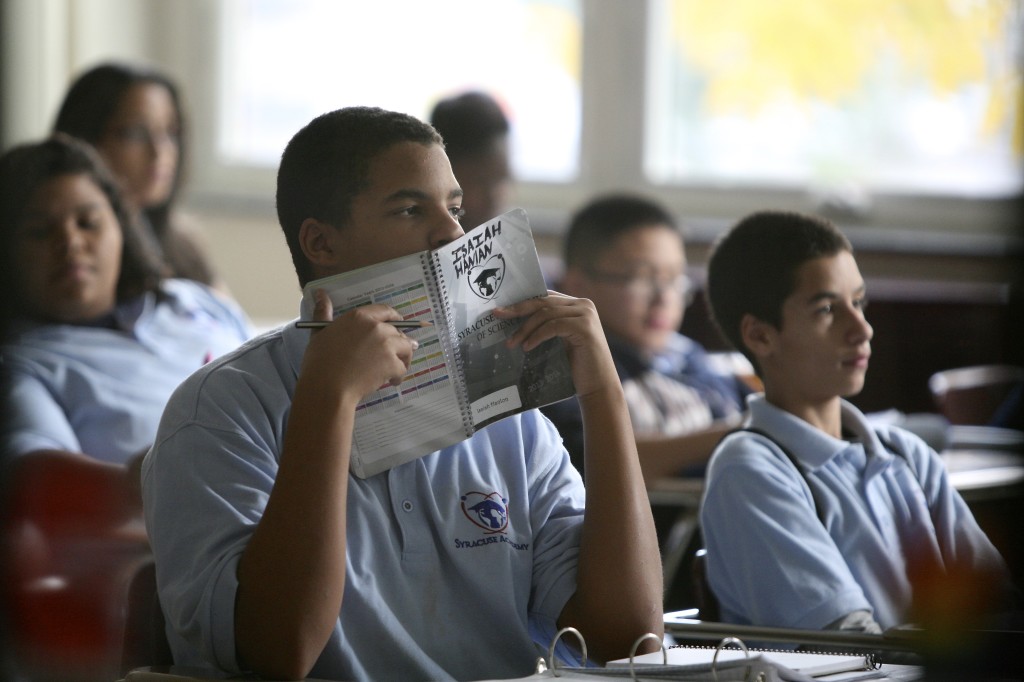
Students listening to a lecture inside a classroom in the Syracuse Academy of Science Charter School.
Michael Davis Photo | Syracuse New Times
When SAS sought to expand and open an elementary school in 2011, the Terra Foundation purchased the St. James School, on South Salina Street, in the Valley. Rejecting bids from local contractors, Terra hired Apple Educational Resources to do the work.
The company’s website lists four projects it has completed, including the SAS elementary school. All the projects are schools with Turkish-American administrators.
In his comments about the comptroller’s audit, Damkaci said the issues raised in the audit had to do with a transition period when SAS was moving its elementary pupils from the Park Street campus to South Salina Street. Damkaci said he felt the need to use known contractors in the rush to get the South Salina building finished in time for the first day of school. Husayin Kara, who at the time lived in New Jersey, managed the project for Apple, though he says he has little construction experience.
Kara denies hiring Zorluoglu, though Apple was responsible for the project during the time the violations occured. No one involved in the renovation of the elementary school takes responsibility for hiring Zorluoglu.
But the elementary school opening was delayed until November, in part because the Environmental Protection Agency busted Zorluoglu in July and shut down work at the school.
Asked about Zorluoglu, Damkaci and Hayali said they did not know him and that the asbestos issue was responsible for only a three-week delay in the school’s opening. Damkaci says in an email that “Terra Foundation is committed to holding itself and its supplier community to the highest standards of business conduct and integrity. Terra also seeks to procure services from local vendors whenever possible.”
“All renovations have been completed by local vendors,” Damkaci adds.
At the time of his arrest, Zorluogulu’s address was in Brewster, Putnam County. YellowPages.com lists 41 asbestos-removal contractors in the Syracuse area.
Sources close to the project say that Zorlouglu’s work showed little knowledge of proper procedures and resulted in widespread contamination of the building. Eventually a local company – Target Group-Central New York – was hired to decontaminate the building before the renovations could resume.
Kara told the
New Times in a telephone interview that he is no longer with Apple. He works as the chief development officer at the Pioneer Charter School of Science, in Everett, Mass., the school founded by Damkaci.
STUDENTS EXCEL IN TEST TAKING
The history of Gülen schools in Turkey may help to explain why the students at SAS do so well on standardized tests.

A student taking notes.
Michael Davis Photo | Syracuse New Times
The explosive growth of the Gülen phenomenon can be traced to the early 1970s, when some of his followers began tutoring at institutes to drill youthful Turks for the high-stakes college entrance exam known by its initials: OSS. That exam can make or break a career in Turkey.
Parents willing to pay for tutoring provided money to the movement, and grateful students who did well developed loyalty to the Gülen community, the “cemaat,” which might explain why so many jobs and contracts at their schools worldwide go to Turks and members of the movement.
Eventually, the movement spawned high schools and colleges of its own.
THE NEW TIMES AND SAS
In the interest of full disclosure: The
Syracuse New Times building is one door down from SAS. We share a parking lot. Spinnaker Custom Products, a company owned by
New Times publisher Bill Brod, has a business relationship with both SAS (Spinnaker makes uniforms and other items for SAS students) and with the Terra Foundation
http://www.syracusenewtimes.com/exerting-influence/
Foot note this school had an Islamic prayer room and a video of it was sent by a "departing teacher" The video can be found on this blog.
